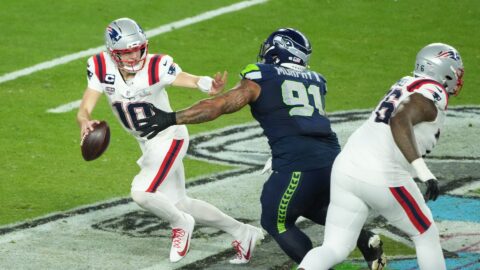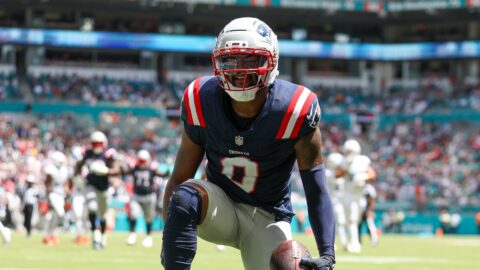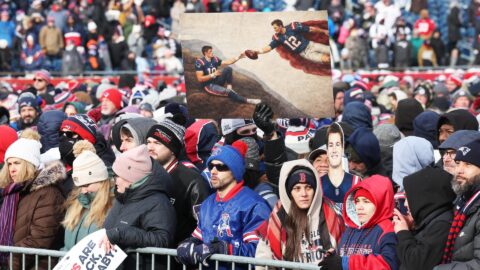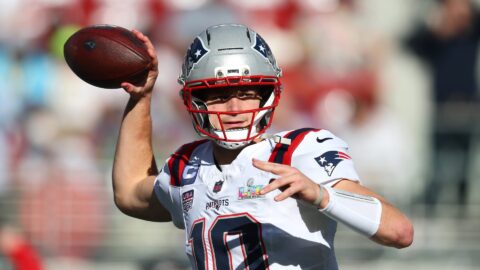Like any player in a contract year, Patriots wide receiver Wes Welker has taken a gamble on his health, and it has paid off so far.
Welker, who is grossly outplaying his $2.15 million base salary in 2011, had the leverage to approach the Patriots about a contract extension before this season. And, who knows, maybe he did.
The point is, the two sides probably could have worked out a reasonably fair contract extension over the summer. But both Welker and the Patriots have yet to reach an agreement. It makes sense for both sides to wait, though Welker has still looked like the big winner in the race for the upper hand during the 2012 offseason negotiations.
First, from a Patriots perspective, they were looking at a player whose performance dwindled in 2010, when he returned from an ugly ACL tear. Welker had 86 receptions and 848 yards, which was the worst statistical performance of his first four years in New England. He had 25 fewer catches and 317 fewer yards than his previous lows in 2008, when Matt Cassel was under center.
Plus, Welker was clearly (and understandably) lacking explosion, and he couldn’t separate from defenders as easily. This led to more drops and harder hits. Last offseason, the Patriots’ brass had to question whether or not that would be a trend or an aberration. But at the very least, those heavy hits take their toll over time, and with the league’s new concussions rules, it’s a lot harder to sneak a player back onto the field following a head injury (the NFL has reportedly looked into instances this season when players have returned after such an injury).
Therefore, if the Patriots offered Welker a contract last summer, it would have certainly been based off good faith that Welker could return to full health. And contracts based on good faith always mean “team friendly.”
For that, Welker has been smart to hold off on anything. Plus, if he signed anything over the summer, he’d be granting the injury-protection factor, which is one of the primary reasons why a player renegotiates before the expiration of his current deal.
Now, Welker is working his way toward an even bigger contract. He’s got 51 receptions for 785 yards and six touchdowns through six games, and he is on pace for 136 receptions, 2,093 yards and 16 scores, all of which would be career highs by wide margins (by 13 receptions, 745 yards and eight touchdowns). Welker is also on pace to break Jerry Rice‘s single-season mark of 1,848 receiving yards, and he’s not far off the pace of Marvin Harrison‘s single-season reception record of 143.
Basically, Welker has regained the form he showed when he paced the offensive receiving attack, and this might be displaying his truest worth this season to Tom Brady, who could always rely on Randy Moss in 2007 and didn’t have anyone other than Welker to count on in 2009. Last year was different because of Welker’s recovery and the implementation of Deion Branch, Rob Gronkowski and Aaron Hernandez.
Now, Brady has the most balanced arsenal of his career, and Welker is still posting numbers that stand to shatter his previous highs. His routes have been flawless, and his burst after the catch has been outstanding. Welker has also been clutch with a pair of fourth-down catches (including a touchdown) on the game-tying drive in Buffalo and three receptions during the game-winning drive against the Cowboys.
Welker said two weeks ago that he definitely wouldn’t be the same receiver without Brady. While that’s not the thinnest limb in the forest, it’s at least a sign that Welker appreciates his opportunity with the Patriots’ offense. And although he hasn’t disclosed any information about his contract discussions — if there are or have been any — he has said he wants to remain in New England.
Patriots owner Robert Kraft told WEEI last week that he wants Welker to play the rest of his career for the Patriots, but Kraft also made it clear that the organization wouldn’t overpay for his services, which at minimum, was a public negotiating tactic.
If Welker reaches an extension with the Patriots, it likely won’t be until after the season when his value will be at its highest point, barring injury. Those negotiations could get tricky, especially if he listens to other teams, if only to drive up his own value.
Expect Welker to remain with the Patriots. He needs them as much as they need him, and they’ll reach that business understanding soon enough. But to this point, Welker has taken the perfect steps to prove he has overcome his knee injury and maximized his value to the offense and the organization.



